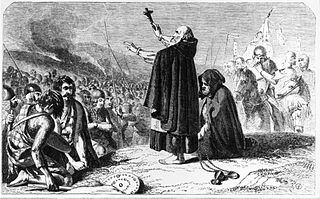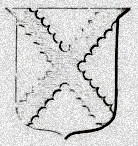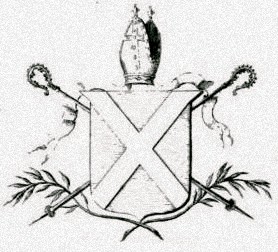Robert Blackadder was a medieval Scottish prelate, diplomat and politician, who was Abbot of Melrose, Bishop-elect of Aberdeen and Bishop of Glasgow; when the latter was elevated to an archbishopric in 1492, he became the first ever Archbishop of Glasgow. Blackadder died while en route to Jerusalem on pilgrimage.

The Prior, then Abbot and then Commendator of Dunfermline was the head of the Benedictine monastic community of Dunfermline Abbey, Fife, Scotland. The abbey itself was founded in 1128 by King David I of Scotland, but was of earlier origin. King Máel Coluim mac Donnchada had founded a church there with the help of Benedictines from Canterbury. Monks had been sent there in the reign of Étgar mac Maíl Choluim and Anselm had sent a letter requesting that Étgar's brother and successor King Alaxandair mac Maíl Coluim protect these monks. By 1120, when Alaxandair sent a delegation to Canterbury to secure Eadmer for the bishopric of St Andrews, there is a Prior of the Dunfermline monks by the name of Peter leading the delegation. Control of the abbey was secularized in the 16th century and after the accession of James Stewart in 1500, the abbey was held by commendators. In the second half of the 16th century, the abbey's lands were being carved up into lordships and it was finally annexed to the crown in July, 1593.
Clement was a 13th-century Dominican friar who was the first member of the Dominican Order in Britain and Ireland to become a bishop. In 1233, he was selected to lead the ailing diocese of Dunblane in Scotland, and faced a struggle to bring the bishopric of Dunblane to financial viability. This involved many negotiations with the powerful religious institutions and secular authorities which had acquired control of the revenue that would normally have been the entitlement of Clement's bishopric. The negotiations proved difficult, forcing Clement to visit the papal court in Rome. While not achieving all of his aims, Clement succeeded in saving the bishopric from relocation to Inchaffray Abbey. He also regained enough revenue to begin work on the new Dunblane Cathedral.
Robert de Prebenda was a 13th-century Anglo-French cleric who was a Bishop of Dunblane, Scotland.

Maurice was a 14th-century Scottish cleric who became Prior of Inchmahome, Abbot of Inchaffray and then Bishop of Dunblane. He was Prior of Inchmahome Priory in Menteith after 1297. He became abbot of Inchaffray Abbey in Strathearn between March 1304 and October 1305. As Abbot of Inchaffray, he held a canonry in the diocese of Dunblane, that is, the precentorship of Dunblane Cathedral. After the death of Nicholas de Balmyle, he was elected to the bishopric of Dunblane. He was consecrated to the see before 23 March 1322, after litigation at the Papal court. King Edward II of England had nominated one Richard de Pontefract to the see, while Roger de Ballinbreich had also been elected by the chapter; both of these men were overlooked by the Pope in Maurice's favour.

Henry de Lichton [de Lychtone, Leighton] was a medieval Scottish prelate and diplomat, who, serving as Bishop of Moray (1414–1422) and Bishop of Aberdeen (1422–1440), became a significant patron of the church, a cathedral builder, and a writer. He also served King James I of Scotland as a diplomat in England, France, and Italy.
Michael Ochiltree [Ouchtre] was a 15th-century Scottish prelate and administrator. A close associate of King James I of Scotland, from the late 1410s he rose in rank from canon to Dean of Dunblane and then Bishop of Dunblane. He was responsible for the coronation of King James II of Scotland, and he obtained a grant from the crown which allowed the comparatively small diocese of Dunblane to attain historically unprecedented viability.
Robert Lauder was a Scottish prelate and Nuncio of the 15th century. The Lauder family produced a large number of senior churchman in this period, and alongside Robert can be named William Lauder, Bishop of Glasgow, Alexander Lauder and Thomas Lauder, both Bishop of Dunkeld, and George Lauder, Bishop of Argyll.
Thomas de Buittle [Butil, Butill, Butyll, Butyl, Bucyl] was a Scottish prelate, clerk and papal auditor active in the late 14th and early 15th centuries. Probably originating in Galloway, Scotland, Thomas took a university career in canon law in England and France, before taking up service at the court of Avignon Pope Benedict XIII. He obtained a number of benefices in the meantime, including the position of Archdeacon of Galloway, and is the earliest known and probably first provost of the collegiate church of Maybole. The height of his career came however when the Pope provided him to the bishopric of Galloway, a position he held from 1415 until his death sometime between 1420 and 1422.

Albin was a 13th-century prelate of the Kingdom of Scotland. A university graduate, Albin is known for his ecclesiastical career in the diocese of Brechin, centred on Angus in east-central Scotland.
Fionnlagh MacCailein or Finlay Colini was a medieval Scottish bishop. Both his early life and the details of his career as Bishop of Dunblane are not well known, however it is known that he held the latter bishopric between 1403 and his death in 1419. He was part of the circle of Robert Stewart, Duke of Albany, and was one of the many clerics from west and central Gaelic-speaking Scotland who benefited from the latter's patronage. He is said to have authorised the construction of the first bridge over the river Allan at Dunblane.
Dúghall of Lorne [or de Ergadia] was a late 14th century and early 15th century prelate in the Kingdom of Scotland. Probably a MacDúghaill (MacDougall) from the province of Lorne in Argyll, he appears to have studied at the University of Oxford before returning to Scotland for an ecclesiastical and administrative career. He obtained benefices in the diocese of Argyll, Dunkeld, Dunblane and St Andrews, and acted as the secretary and chaplain of Robert Stewart, Earl of Fife, before becoming Bishop of Dunblane. He held the bishopric of Dunblane until his death in 1403.

Nicholas de Balmyle, also called Nicholas of St Andrews, was a Scottish administrator and prelate in the late 13th century and early 14th century. A graduate of an unknown university, he served his earliest years as a clergyman at St Andrews, moving on to hold churches in Lothian as well as deputising to two archdeacons of Lothian.
Andrew Magnus was a 14th-century Scottish prelate. Of unknown background, he is recorded for the first time in a document dating to 28 November 1365, holding the position of Archdeacon of Dunblane. Having merely been collated to this position by an ordinary, perhaps the Bishop of Dunblane Walter de Coventre, he received a fresh papal provision on 6 January 1367.
William de Cambuslang was a 14th-century Scottish churchman, presumably coming from a family based at or originating from Cambuslang near Glasgow.
Walter Stewart was a 15th-century churchman in the Kingdom of Scotland. He was a cousin of King James II of Scotland, being like King James a grandson to King Robert III of Scotland.
Walter de Coventre was a 14th-century Scottish ecclesiastic. There is no direct evidence of his birthdate, his family, or his family's origin, although he may have come from the region around Abernethy, where a family with the name de Coventre is known to have lived. Walter appeared in the records for the first time in the 1330s, as a student at the University of Paris. From there he went on to the University of Orléans, initially as a student before becoming a lecturer there. He studied the arts, civil law and canon law, and was awarded many university degrees, including two doctorates. His studies were paid for, at least partially, by his benefices in Scotland. Despite holding perhaps more than five benefices at one stage, he did not return to Scotland until the late 1350s.

The Archdiocese of St Andrews was a territorial episcopal jurisdiction of the Catholic Church in early modern and medieval Scotland. It was the largest, most populous and wealthiest diocese of the medieval Scottish Catholic church, with territory in eastern Scotland stretching from Berwickshire and the Anglo-Scottish border to Aberdeenshire.
Robert Arthur "Bob" Gillies is a retired British Anglican bishop. From 2006 to 2016, he served as the Bishop of Aberdeen and Orkney in the Scottish Episcopal Church. He is also a published author.

Cum universi is a papal bull written by Pope Celestine III, issued on 13 March 1192. The bull ended the claim of the Archbishop of York to metropolitan jurisdiction in Scotland and established an independent national church, albeit one with no figurehead.






